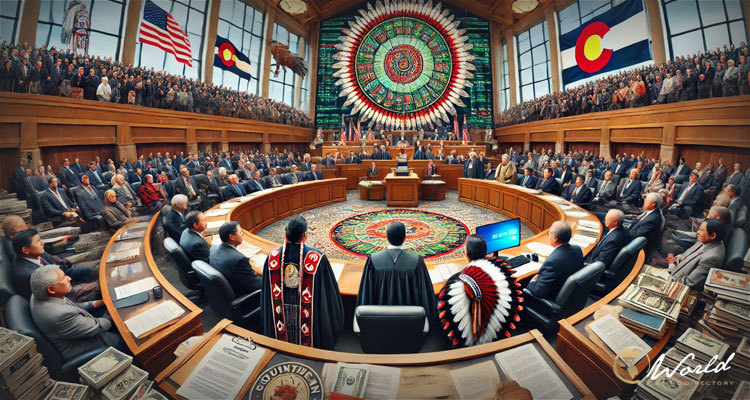
The Ute Mountain Ute Tribe has now joined forces with the Southern Ute Indian Tribe in a legal battle against the state of Colorado, aiming to correct what they describe as unfair treatment regarding access to online sports betting. Both tribes claim they have been denied the economic opportunities guaranteed to them under long-standing agreements, and are demanding the state live up to its obligations.
Ute tribes seek justice over online sports betting dispute:
Ute Mountain Ute Tribe Chairman Manuel Heart emphasized the tribes’ frustration, stating, “The State must live up to its obligations to our Tribes as outlined in agreements and federal law. Because of this ongoing injustice, we are also now taking the unfortunate but necessary step of legal action to correct this.” Heart added that the state’s actions are “holding back” the tribes from accessing economic benefits they are rightfully entitled to.
Similarly, Southern Ute Indian Tribe Chairman Melvin J. Baker expressed his dissatisfaction with the state’s approach, declaring in a press release, “Enough is enough. This unfair treatment must end now. Our Tribes are demanding immediate action to rectify this injustice and ensure the State fulfills its obligations.”
The dispute centers around the tribes’ exclusion from participating in the lucrative online sports betting market, despite long-standing State-Tribal compacts that explicitly allow them to engage in such activities. Both tribes argue that the Colorado Department of Revenue has unjustly blocked their access, while non-tribal private entities have enjoyed exclusive participation since 2020.
These State-Tribal gaming agreements, in place for nearly three decades, were approved by the federal government and permit the tribes to engage in “those gaming activities and bet amounts that are identical to the activities and bet amounts that are authorized in the State of Colorado.” When Colorado voters passed Proposition DD in 2019, legalizing online sports betting, it opened up new economic avenues for gaming operators, including the Ute tribes. However, for the past four years, the tribes have been unable to access these opportunities due to state roadblocks.
Taxation at the core of the conflict:
The central issue appears to be the state’s inability to tax the tribes’ gaming operations. Under federal law, tribal gaming revenues are exempt from state taxation, and any proceeds must be used to support tribal government functions and the welfare of tribal members. This legal restriction has become a sticking point, as Colorado continues to block the tribes from fully participating in the online sports betting market.
This year, while Colorado legislators had the opportunity to introduce a ballot measure for 2024 that would address this inequity, they failed to act. In contrast, the state of Kansas, which implemented online sports betting in 2022, quickly amended its law the following year to allow tribal gaming entities to participate, acknowledging the competitive disadvantage the tribes had faced initially.
For years, the Ute tribes have attempted to negotiate a fair resolution with the state, but their efforts have been met with resistance. Now, both tribes have turned to the federal court, seeking an injunction to ensure their rightful participation in the sports betting industry. They argue that without equal access to this market, they are being unfairly excluded from an economic opportunity that was legally established for all gaming operators in Colorado.
Despite the legal obstacles, the Ute tribes remain determined to push for a resolution that will allow them to fully participate in the online sports betting market. With a firm commitment to fairness, both tribes are hopeful that the court will recognize the legitimacy of their claims and compel the state to honor its obligations. “We can ensure a future where the promises of today blossom into a brighter tomorrow,” the tribes collectively declared, underscoring their dedication to achieving a just outcome.
Online casino in India refers to virtual platforms where Indian players can participate in various casino games, such as slots, poker, roulette, blackjack, and card games like Teen Patti and Andar Bahar, through the internet. These online casinos offer a wide variety of gambling experiences, allowing players to place bets, win prizes, and enjoy live or digital versions of traditional casino games from the comfort of their own homes.
Reputable online casinos in India are licensed and regulated to ensure fair play, data protection, and the security of financial transactions. Trusted casinos use advanced encryption technology to protect player information.
In summary, an online casino in India provides Indian players with access to a wide range of gambling options in a secure and convenient environment, offering both entertainment and the chance to win real money, all while adhering to local regulations.





